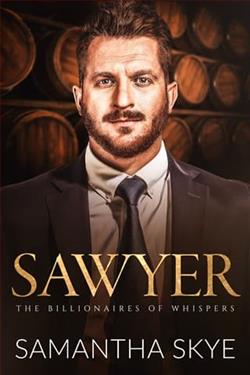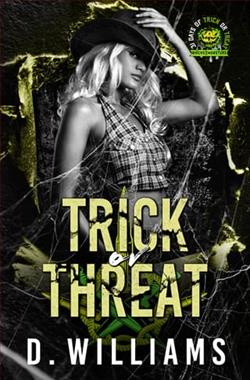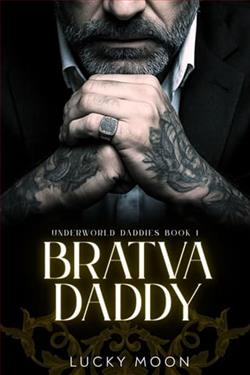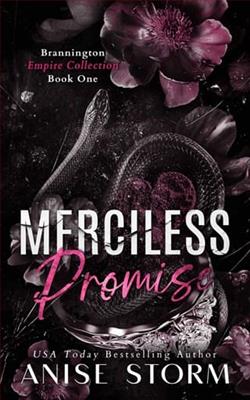Page 27 of Audacity
CHAPTER 12
Gabe
Debussy observed that it’s the space between the notes that holds the music, and, in my previous vocation, I often observed something similar. It was the pauses, the voids, when my heart felt fullest and God felt closest.
While I delight in my faith’s love of pomp and ceremony as much as the next Catholic, I’ve often wondered if those early Protestants, those first solifidianswere onto something. They proposed the concept of faith alone—sola fide—being enough.
A void entreats us to fill it, you see. A nullity invites prayer in a very different way than the heart-swelling, gladdening triumph of soaring voices or the towering, almost architectural layers of organ music do.
Some of the times I’ve communed most effortlessly with God have, in fact, been when my faith stepped in, in all its unfathomable, swirling, glorious abundance, to fill a void. There have been a couple of instances at the end of Good Friday services, even, when I’ve undertaken that systematically solemn act of stripping the altar.
I’ve removed the altar cloth, leaving the altar itself as bare and desolate and hopeless as that cross was when they took Christ’s body down from it. I’ve snuffed out candles andshrouded crucifixes in the bleakest, blackest cloths and had my altar boys bear away armfuls of flowers, and I would swear on the relics of any saint that, on an occasion that should feel starkly grieving, I have found myself aglow from within.
It’s almost as if, having extinguished the ever-burning sanctuary light by the tabernacle, I have obliterated every last visual trapping that tethers us poor, blind sinners to the path, to the truth, leaving one last thing.
Faith.
As if it’s only when everything else has been brutally gutted that I can find the space to feel, to hear, to see that faith, small and quiet, but palpable and brave.
The more I sink into this quicksand of lay life, especiallymyparticular brand of lay life, with its money and trappings and equally shiny cars and women, the more I become numbed against that plucky, lambent faith. The more I become deafened to its quiet voice.
If I have earthly riches beyond what is probable or decent or fair, there’s a spiritual paucity in my life these days that my fleeting moments with my rosary or Book of Hours simply cannot fill, and I feel it like an itch, like the abrasive reminder of a horsehair shirt.
It’s ironic, perhaps, that I should spend the anniversary of Christ’s birth musing on the odd but certain comfort that celebrating His death has brought me in the past. I went to Midnight Mass last night, not at my old parish—no fucking way—but at Farm Street in Mayfair. If the sprawling, gilded Brompton Oratory is where you’ll see London’s Spanish and French and Italian populations decked out in all their finery, Farm Street is where that small and curious cultural minority flocks: upper class English Papists.
Midnight Mass tends to give me what daytime Mass on Christmas Day does not—peace and quiet, a hushed solemnity,an understanding that we are gathered in the middle of one of the darkest nights of the year to celebrate Christ’s birth on the very cusp of that miraculous day.
Sadly, my attendance there last night was steeped in pragmatism, as I was required this morning at my parents’ house out near Newmarket, just past Cambridge, for a day of revelry, Sullivan style.
Let me state for the record that if nature likes to claim it abhors a vacuum, it hasn’t met my family. Voids are anathema to the Sullivan clan, and voids in conversation are deemed almost as intolerable as voids in wineglasses.
This year, like every year, I will not spend the Lord’s birthday cultivating enough space to hear my flame of faith flicker bravely into being.
Not on your life.
I’m currently sitting on an overstuffed floral sofa, nursing a pint of Black Velvet in an old silver tankard while trying valiantly to pace myself ahead of what I know will be a long and boozy lunch. My beverage may sound luxurious but, at half Guinness and half champagne, is absolutely fucking lethal, not to mention a spectacular waste of vintage Bollinger. Why they don’t use bog-standard champagne for these I’ve never understood.
I have my tankard angled towards me so no one can see its contents. If Dad thinks it looks too full, he’ll be pissed off that I’m not pulling my weight. If my brother Brendan thinks it looks too empty, he’ll try to top me up. Thank God it’s opaque.
Mum’s on straight Bollinger, as are most of the other women in the room—mainly local friends of my parents. Given our proximity to the famous Newmarket racecourse, the crowd around here is seriously horsey. The only people not getting stuck in are a few designated drivers, who are on low-alc beers. If I didn’t require social lubrication quite so desperately to get me through the rest of the day, I would have volunteered to ferrypeople home. As it is, my plan is to maintain a steady low-level buzz and avoid attention where possible.
‘Come and chat to us, for fuck’s sake, Gabe,’ Dad booms in a thick Dublin accent from the huge stone fireplace where he and Mum are holding court. My parents’ high social standing around here is well deserved and easily explained: they’re fucking loaded, highly sociable, and way too generous when they host—which is a lot.
Not to mention, this house we grew up in is gorgeous. Over-furnished, but gorgeous, and a far cry from the slums near the Dublin docks where Dad grew up as a young lad, where the privy was out the back and he, as the eldest boy, had the great fortune to get the first go in the warmish, cleanish bath water when the seven kids had their weekly washes.
Apparently, his youngest brother, Niall, grew up knowing only cold baths laced with his six older siblings’ piss. Poor fucker.
I force myself off the sofa and amble over to the gaggle of men and women at the fireplace with a smile I hope belies my reluctance. Gerald, one of my parents’ three lurchers, presses his long, shaggy face to my thigh and I reach down to rub him sympathetically between the ears. He, too, hates a full house.
‘Here.’ After a cursory glance at the two-inch gap in the top of my tankard, Brendan tops me up with two hands, pouring draught Guinness from a can with one hand and Bolly with the other.
‘Try doing that after dinner and see how much you spill,’ I tell him, and he grins broadly. ‘You’re on.’
Brendan and I are what’s known impolitely asIrish twins. I arrived eleven months after him, a fact that makes me very fucking angry on behalf of my mother. Not even in my days as a priest have I ever been comfortable with the Church’s take on contraception. There are some areas where pragmatismand compassion and human fucking decency trump ancient theological tenets, and birth control is one of them.
It’s often said that I should have been the eldest—I am, after all, far more responsible than Bren—but I don’t necessarily agree. He’s the doer, I’m the thinker. And while I was enjoying a profession where thought was integral, Brendan was working his way up in our family’s core construction business, assuming the helm before the IPO a few years back and proving himself.
He’s impressively smart and impressively driven, but when he’s not at work he’s terrifyingly basic. Or base, perhaps. Both or either.















